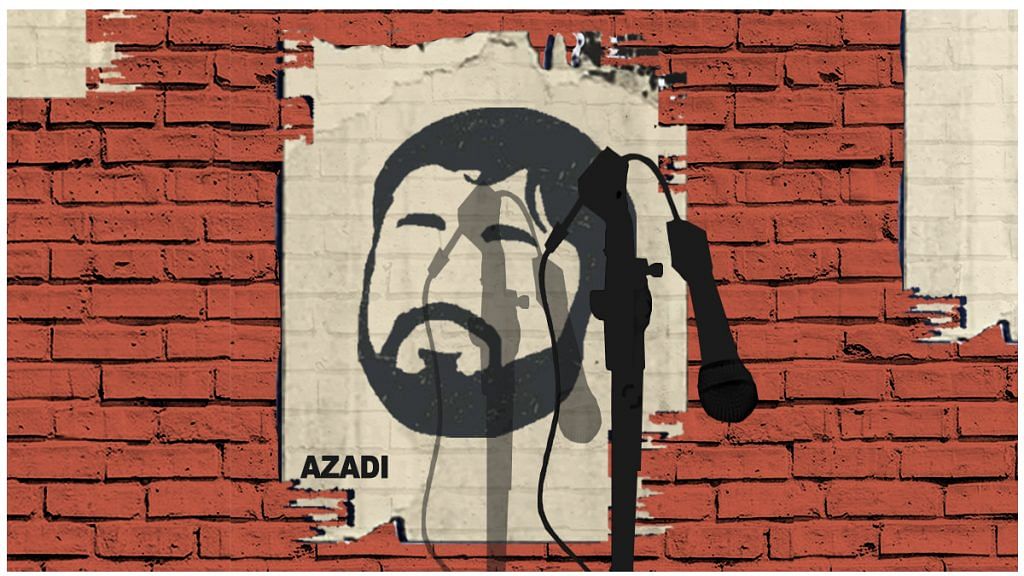In the beginning was the Word, and the Word was with the people, and the Word was azadi.
Not too long ago – 70 years is not long for a 5,000-year civilisation – azadi was a rallying cry of an unfree Mother India. Today, it is the desperate plea of her children. Whether it is Kanhaiya Kumar or Kamla Bhasin or Mehak Mirza Prabhu, azadi is now a regime-threatening slogan in the era of Narendra Modi and Amit Shah.
They can say they want azadi from Hindutva, casteism, capitalism, but all that the BJP lovers will hear is seditious “Jinnah wali azadi”. Umar Khalid’s chants are spliced and edited in the BJP IT cell factory and made into “Hinduon se azadi”.
But the azadi Indians want is completely different.
जातिवाद से आज़ादी
मनुवाद से आज़ादी
सामंतवाद से आज़ादी
पूंजीवाद से आज़ादी
भेद–भाव से आज़ादी
नफ़रत–हिंसा से आज़ादी
पितृसत्ता से आज़ादी
Freedom from casteism
Freedom from Manusmriti
Freedom from feudalism
Freedom from capitalism
Freedom from discrimination
Freedom from hate and violence
Freedom from patriarchy
Also read: Why students in Pakistan, like in JNU, are raising azadi slogans
Azadi is a Fundamental Right
Now, asking for azadi is apparently anti-India and anti-national. And the Modi government sees it as the war cry by ‘urban Naxals’ and the ‘tukde tukde gang’. The word must not be heard in New India, according to them.
That’s why the Delhi Police is planning to act against the student who held up a ‘Free Kashmir’ poster in St Stephen’s. The Mumbai Police has already filed an FIR against Mehak Mirza Prabhu who also held up such a poster.
No arrests yet of the masked goons who attacked JNU students though.
Anyone with half a grey cell in their brain would know that people are not asking for azadi from India but in India. Today’s India is a battle between fake news and truth, which is often bullied into silence. And people are demanding azadi from this bullying.
Azadi means freedom. One of the Fundamental Rights in the Constitution of India is the right to freedom. It includes, among other things, freedom of speech and expression as well as the freedom to assemble peacefully. It is this Fundamental Right of azadi that people are using during the anti-Citizenship (Amendment) Act and National Register of Citizens protests.
The protests have stunned the nation and the Modi government with its vigour. More so because India is reverberating with the demand for azadi now. Many believe that India is plummeting towards becoming a theocratic autocracy, where the essence of India – secularism – is being snuffed out. All in the name of religion. Azadi is an obvious demand.
Also read: Modi’s India unhappy with protesters singing Faiz’s Hum Dekhenge. Zia’s Pakistan was too
We built India on azadi
Indians have been asking for azadi since the British Raj. The British colonised India and drained it in two significant ways – economically, and by taking the Indian voice away and turning them into second-class citizens in their own land. Nationalists of the time laid their lives for India’s azadi. Nationalists of today can’t bear to hear the word.
It is a word that then became something only heard in Kashmir and was branded as the demand of separatists who did not want Kashmir to be a part of India.
But then a young Kanhaiya Kumar in 2016 used the word ‘azadi’ in Jawaharlal Nehru University and all hell broke loose. Charged with sedition for raising ‘anti-India’ slogans, which included the word azadi, Kanhaiya clarified after being released on bail that he did not want azadi from India but within India.
It clicked. People got what azadi meant now for India. It almost had cult value. The movie Gully Boy starring Ranveer Singh and Alia Bhatt dedicated an entire rap song to Azadi. People eventually began to understand the larger, non-Kashmir-related demand of azadi. The Congress even fought the 2019 Lok Sabha election with this song in one of its campaign videos.
Now, the anti-CAA-NRC protests have given a new lease of life to the word azadi.
Also read: Modi-Shah’s BJP govt has failed India’s youth and is now stuck fighting them
A new azadi
The azadi that Indians are asking for today is much like the one Indians asked for before Independence. Only this time, the fight is not against foreigners, but an ideology.
Muslims are being made to feel socially inferior and minorities relegated to the margins again. Dalits, women, queer people and the poor have been oppressed for centuries. But Narendra Modi and Amit Shah seem set on the idea of a Hindu Rashtra. Which is why azadi is being demanded within the boundaries of India where old, dogmatic and dated concepts of race and religion are being used as criteria for citizenship.
People want an India where they can live without the fear of being judged and ostracised. No one wants to be asked if they’re eating beef or pork or paneer. No one wants to be told what to wear or be marked by their clothes. No one wants to be told to which temple and mosque they can or cannot go. No one wants to lose a job because of their caste or sexuality.
That’s the new India we want.
India was built on azadi, there is no India without it. We must demand it without fear.
The author is a political observer and writer. Views are personal.
